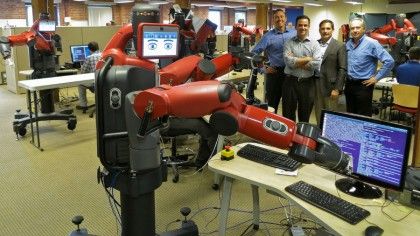Future robots may help the rich get richer while the poor struggle, claims study
Taking the entry level jobs first

One of the common themes in conversations about the future of employment is the idea of robots taking our jobs. Now it seems that there is a risk that the specific types of jobs that we are going to lose are the ones that help most with social mobility.
According to a report published by UK charity Sutton Trust, the jobs that are most likely to be taken by developments in artificial intelligence are those that straddle the skilled and unskilled bracket. Identified by the paper as ‘paraprofessional’, these roles are typically jobs that require no qualifications but are often entry-level positions.
The general consensus about automation and the job market is that the purpose will be to take away menial parts of people’s jobs to free them up to do more important work. The issue is that if you are working a menial job to get your foot in the door, that job may not exist anymore.
What’s worse, jobs that are typical lower-middle and working class appointments like sales, customer service and trade are particularly at risk, as jobs that require repetitive skills are the easiest jobs for machines (whether that’s a robot or an AI) to take.
From the STEM branches can grow
What this will mean is that it will potentially become harder to work your way out of your current economic bracket. It’s not all doom and gloom though, as the paper highlights the most essential skills moving forward are likely to be STEM skills (science, technology, engineering and mathematics).
While it's fairly pessimistic about the ability of people from a lower economic bracket from being able to attend prestigious higher education, we are definitely entering an age where the ability to learn STEM skills is getting easier thanks to the internet.
As the digital sector is the field most in need of STEM workers, it has a vested interest in training the next generation with the skills necessary to work in the field. Because of this there are numerous projects (many of them free) and even toys where young people can learn coding, one of the essential building blocks of a successful career in the digital world.
Get daily insight, inspiration and deals in your inbox
Sign up for breaking news, reviews, opinion, top tech deals, and more.
There is no doubt that we are in a vast state of flux with the job market. The current figures show that: “millennial workers (born 1981-2000) are expected to have an average of 17 jobs and five careers over their lifetime, compared to 1970 when males had on average between two and five jobs”.
- We attended a talk at TechXLR8 where they had this to say about the future of employment: Our greatest weapon in the war to keep our jobs is to be more female
Via The Verge
Andrew London is a writer at Velocity Partners. Prior to Velocity Partners, he was a staff writer at Future plc.
Most Popular

